Tell us about yourself
I’m Noella, people also know me as Chook as it is easier to remember. I am living in Munno Para, South Australia, but move regularly due to my boyfriends job.
I’m currently sitting at 29yrs old, hitting the big 30 in August, and I’m super keen for the party but that’s about it.
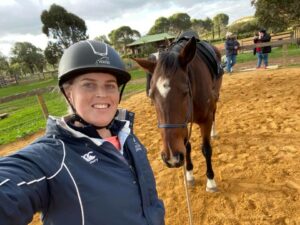
What has been your journey of disability?
A long one. I was born with arterial vascular malformation (AVM) which affects the development of blood vessels, soft tissues and bones and is also known as Klippel-Trenaunay syndrome, in my right leg, from toe to mid waist. It took 5 years to diagnose and once we had that we were off to the USA for medical treatment (Alcohol Embolization)
At that time, it was the only place in the world treating my condition. We travelled for 6-7 years and lived there for a few of those. We treated the condition quite aggressively and I was one of the first to have back-to-back treatments, where you would have a treatment, stay the night, and then have another.
Each treatment is a general anesthetic, absolute ethanol-based injections plenty of narcotics and steroids for the pain and swelling – you can only imagine the toll it took on a body. But hey, I’ve now got a good tolerance when I head out to the pub!
We were lucky to have the Overseas medical board cover my medical expenses but as the amount started to climb to four million dollars, they saw treatment was available in Australia. This took us to Melbourne, where I was treated till 2019.
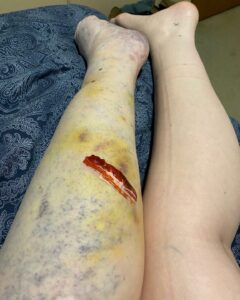
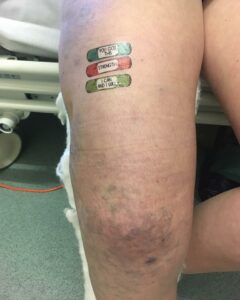
I had my first treatment in Adelaide back in June 2021 and it still amazes me that I can be treated in my home state compared to only 22 years ago when we had to travel to the USA. We now know that there is no cure for this, it’s more of a management thing and trust me, I’ve kept count. So far, I’ve had 103 treatments.
From treatment and life, I’ve got lots of contraction and other complications, so I have lived on forearm crutches for the past 17 years.
My medical story I find is tricky to make sound cool or have that ‘wow, what a comeback’. For me and my condition, it is a constant comeback story. There have been many big heart aches along the way and sadly, I don’t think I’m finished on that road.
My latest comeback story was a super nasty break in 2018 that left me bed ridden for 9 months and it was 18 months in total before I could get back on a horse. However here we are again, I’m getting back on the horse and having another crack. Just call me resilient.
Currently we are looking at above knee amputation to help with my quality of life.
“You can use your disability to build yourself up, you can be confident in your disability, but you don’t have to “be” your disability; and ..you can be loved”
What do you do with yourself?
I am working for Allington’s Outpost as country clothing retailer here in SA. I started with them back in June and have just flourished. It’s a great job and they have been quite accommodating to my changing needs, I have many jobs roles to fit my body and ability where needed.
Outside of work as do way too much, I am an Equestrian with long term goals to get to the Paralympics for Dressage and love to help/advocate for other riders looking to get involved.
I have been involved with horses since before I could walk and have ridden in many disciplines, from Stockman’s Challenges to Dressage, eventing, show horses, showjumping, camp drafting and anything in between. I don’t call myself a typical Para-Equestrian.
I am into whip cracking, and I have placed 3rd in the Australian Whip cracking National Championships in 2010 and came 1st the Royal Adelaide SA State Championships in 2013.
I am also into crafts, coaching, camping, gaming, and lots more. I am typically tired and not bored. Over the years I have developed many skills both in and outside of the Equine Industry some areas including visual arts and event management.
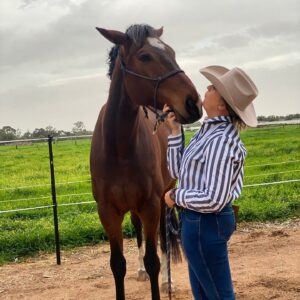
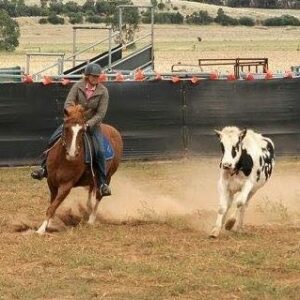
How did you come to doing what you do?
Previously I was working for family business teaching horse riding, managing events and social media.
A lot of this was done online when I was living in Victoria (pre covid) and when we moved back to South Australia, I continued, however it was an hour and a half drive each way. I was finding it challenging to drive so far, be an accountable worker and manage my time at home. If I was closer or my disability was not as taxing, I feel I could have continued, however I saw a post for Allington’s Outpost and applied.
The HR manager knew of me from the equine world and was willing to give it ago and adapt what was possible for work. I needed a job where you went to work and left work at work. I had no previous retail experience but I have an upbeat personality so I can sell ice to an eskimo, plus working in small business you get a good face for retail.
Has having a disability in the field of equestrian sports created unique challenges for you?
I would say no however in hindsight possibly. I guess there were small hurdles that able bodied people wouldn’t need to go through, such as in Pony Club where they attempted to restrict the certificates I could do as I was unable to mount a horse is the ‘typical style’.
I had taught my horse an adaptive move to enable me to mount. The move met the syllabus and was sent to national office to be approved as safe. There have been judges along the way that would say “you can’t enter this class as you are on crutches”, other would say ‘oh I would of placed you higher if I had known you had a disability and not just riding uneven for no reason’.
So yes, there have been unique challenges but I’ve been one to rise and kick on.
Not so much now as my disability had worsened but in my younger years, I went and competed in events that many able people would not try and did well. Sure I didn’t win but I participated and achieved more than most.
“So yes, there have been unique challenges but I’ve been one to rise and kick on.”
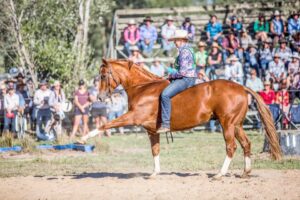
Does your disability impact on how you participate?
It didn’t for many years, I honestly called myself able until I’d have treatment and need down time, my down time is when I am my most disabled..
In the past few years, I have had a massive fracture, loss of fitness and mobility. It feels as if I am impacted now. In the horse world I use to jump, challenge, camp draft, event, you name it I’d have a go at it and typically do well, now, now I am a dressage rider and personally struggle with only being a dressage rider. This is a new thing for me and one I am working on accepting.
I still travel interstate with two horses and not think twice about it, but I am learning that I gain more in the arena if I have support crew on the ground. It’s been a big adaption for me as it is playing with words like ‘loss of independence’ and I know I could of done it by myself once upon a time.
How has having disability in the “horse” world and dressage been accepted by others?
It’s a lot more known now with the Paralympics being televised as people are seeing it more and more. There is still the typical ‘oh you like ponies’ said to you in a childish voice, typically I hear it by doctors more than others, however now you can correct them as say “no I am looking to compete at the Paralympics” and they change their tune.
The para dressage community is one of the best out there, it can take a bit it gets in as it’s a bit “clickie “ but it’s definitely warming up over the time I’ve been involved. I love to go and compete or watch as you will always have a laugh, get to know new people, and find amazing stories along the way.
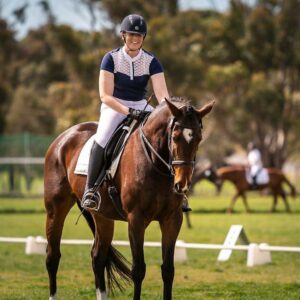
How do you navigate being around such large animals like a horse with mobility aids?
I rarely have needed to navigate around horses with my aids, I use forearm crutches for balance. Other the years I have only had a few horses I have struggled with work with, but most of the time I find them quite helpful.
When you go looking to buy horses, it is quite useful to use my crutches to find out how quiet a horse is or how willing to accept things. A bonus is my crutches are like long arms, so I use my crutches to bump them (the horses!) if they are slow or lazy. With the bigger items such as the mobility scooters, it can take a bit more time and familiarisation, but it’s quite simple to work around. Horses are very adaptable animals and with time and training horses will do almost anything you ask.
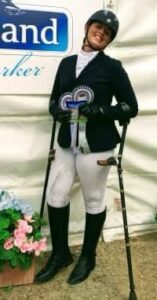
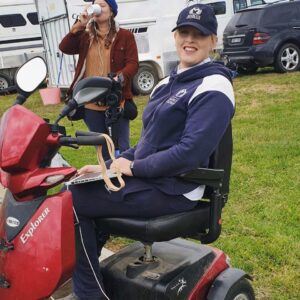
“You can use your disability to build yourself up, you can be confident in your disability, but you don’t have to “be” your disability; and ..you can be loved.”
You are involved in programs to promote Para Equestrian sport, why is this important to you?
I try to promote the sport, however there aren’t a lot of publications out there outside of our personal sport Facebook pages, but groups like Equine Pathways Australia are working on changing this.
I work on promoting Para Equestrian sport by just being in the sport and talking about it where possible. I stay involved with State Committees to encourage the sport and help it grow in South Australia. Currently it is quite a small community of riders but with the right push, I hope it becomes a stronger sport in my home state.
It’s important as para sports in general are cool, there are cool people, with cool stories and abilities, and its somewhere to be, and when you’re someone with a disability feeling like the world is against you, it is somewhere to belong.
It’s a group of people with different stories and pathways but no matter what their background is, they just get it. There is something about para sport that gives you this community of support, plus if you are para equestrian you talk about horses all the time with no judgement.
Are there things about you that people misunderstand because of your disability?
My outwards presentation of my disability looks like a broken leg or a knee reconstruction and depending on the time of year, I am mainly asked if I have a Netball or Basketball injury. Having a rare complex condition, everything is misunderstood in one form or another. It’s taken me years to work out how to explain it in a way that people stay interested and it still make sense.
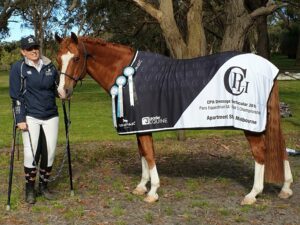
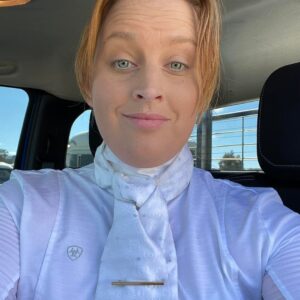
What is one thing, experience or person you have had that completely changed your life?
One… oh I’ve been lucky to have many, and I don’t know there is ability to pick one. I’d have to say my disability has changed my life from the normal life I would have had otherwise. While it’s painful, annoying and life consuming it had given me much more than most people my age.
I have had the opportunity of traveling to the USA for ten years, I’ve lived in two countries and have had birthdays in both hemispheres.
I’ve gotten to ride horses and show many how it’s done whilst being on crutches, I’ve attempted different styles of competition that many people with disability wouldn’t think without thinking twice because I was so able for a disabled rider. All the options that have opened to me because of my disability make it the life changing thing, but for the good reasons.
Is there a single piece (or more!) of technology that makes your life easier? Why?
I use a RAT Barrow, (R A T stands for Ride on, Articulated, Tipping Barrow) It’s a ride on wheelbarrow and it helps me doing physical work as it is great to carry and move items. For me most of my tech are items to help with distance and mobility such as my Mobility Scooter for horse events and my Sidestix Forearm Crutches that I live on full time.
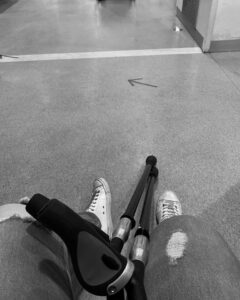
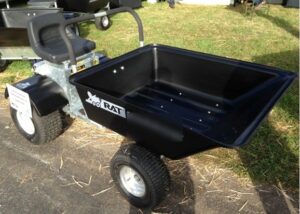
Knowing what you know now, what advice would you give your 18-year-old self?
Enjoy the time you have now, know that yes, your disability is hard, but it is going to get physically harder soon. Do all and more that you can now, take that trip to the UK, move overseas, kiss that boy, enter that horse event, do it all and don’t be held back by your unsureness.
Is there something that you would like people to know about you or about people with disability that they might not know?
I feel that people struggle to see my disability, so I’d like to remind them its purple in the summer and bluer in the winter, and it’s more taxing on me than I tend to let on.
Best advice that you would like to share with other women with disabilities?
We are not superheroes. We are amazing people, but we don’t need to be heroes or a sport star to be a great human. You can use your disability to build yourself up, you can be confident in your disability, but you don’t have to “be” your disability; and ..you can be loved.
It probably sounds silly, but for years I never thought I’d have a boyfriend and be loved because of my leg and all the added needs of my disability, but I was wrong, we can be loved, just love yourself first.
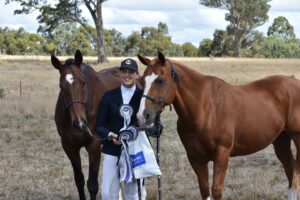
Do you have a way for people to connect or follow you that you would like me to share?
Yes, I have a small following on both Facebook and Instagram.
Facebook. @Noella Angel Para Equestrian
Instagram. @Noella_Angel_PE

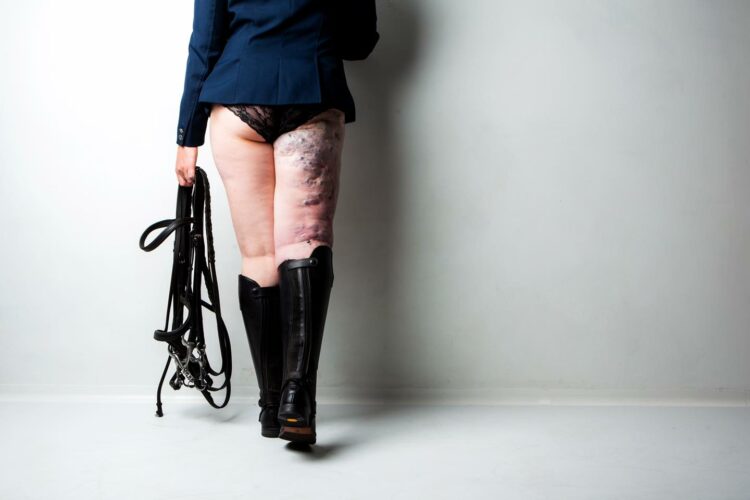
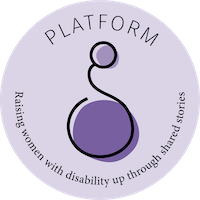

Well done on your journey Noella. It’s not always easy but press on with your courage and cheerful attitude. Make sure you get to the Paris Paralympics because I will be watching closely🥰Good Luck
We are also excited to see what Noella can achieve! Thanks for being part of the Platform Helen.